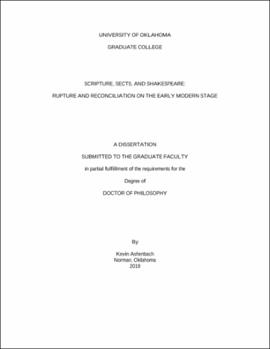| dc.description.abstract | Scripture, Sects, and Shakespeare: Rupture and Reconciliation on the Early Modern Stage explores how Shakespearean drama is shaped by and responds to the Protestant Reformation's crisis of hermeneutical authority. With the widespread practice of sola Scriptura across Western Christendom came a concomitant rise in private judgment among Christians, whereby the individual treats himself as his own highest exegetical authority in interpreting scripture. In this project, I argue that several of Shakespeare's plays evince an unease towards the religious and social fragmentation that resulted from private judgment, and that the dramatist answers this problem in his works through the rehabilitation of what I call interpersonal faith, that is, the individual's entrustment of hermeneutic authority to another living person or group of persons. Beginning with Twelfth Night, I show how Shakespeare dramatizes the struggle between internal and external modes of interpretive authority as that conflict was represented in the anti-Puritan discourse of English conformist writers. Reading the play against this religious backdrop, I argue that in contrast to Malvolio, who prefers a private paradigm of interpretation that leads him into error, Viola proves to be the play's more perceptive reader by looking to the oral testimony of others for verification of her own hopes. In this chapter, I demonstrate how the play's comic resolution is shaped by means of a communal hermeneutic espousing attributes of humility, shared memory, and self-sacrifice that conformist writers were calling their Puritan opponents to embrace if they are to read the Scriptures rightly. If Twelfth Night presents interpretive authority as deriving from an insider's knowledge of a specific community's living tradition, Hamlet explores the religious and political problems that arose within England as a result of replacing one hermeneutical authority figure with another. In my second chapter, I argue that the epistemological crisis Hamlet experiences in reaction to Gertrude's remarriage reflects Catholic concerns towards reform of the English Church and the assertion of royal supremacy. Additionally, I demonstrate how in Hamlet's depiction of the political threat which the prince's ideals pose to Denmark's new status quo, the play casts a tragic light on the conflict between disaffected Catholics and the Protestant state. The third chapter examines how Othello dramatizes the value of interpersonal faith and the limitations of sola Scriptura for sustaining Christian community. Reading Desdemona as figurative for the church, I show how Othello's own judgment and reasoning prove sufficient in explaining his wife's love for him to the Venetian senate, but they fail to withstand the challenge posed by Iago, whose hermeneutic of suspicion towards Desdemona resonates with the protestant critique of the Roman Church as the "whore of Babylon". The play positions Othello in such a way, I argue, that if Othello held an interpersonal faith in Desdemona's fidelity, his reason and imagination would be anchored in that direction as well, stimulating him to generate possibilities for how the evidence presented to him can be reconciled with his wife's faithfulness. In my final chapter, I examine how The Winter's Tale imbues the exercise of interpersonal faith with a sense of the miraculous in its ability to radically transform one's own perception of the world. While criticism has focused on Hermione's resurrection as The Winter's Tale's most important exploration of the miraculous, my claim is that this seeming conversion of stone into flesh at the play's end signifies a more authentic miracle, which is the changing of Leontes' hardened mind. Although it is common to think of Shakespearean drama as celebrating practically unlimited human autonomy, this project demonstrates that the playwright was critical of privatized religion's corrosive effects on communal ties, and shows how his works contended for the free assent to a shared interpretive authority as the basis for an integrated society. | en_US |
